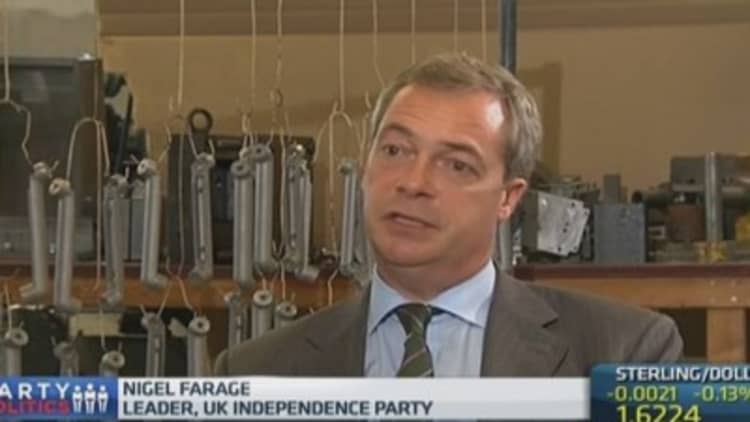
Referendum on EU membership
UKIP member of European Parliament (MEP) Patrick O'Flynn wrote that if UKIP's candidate comes "a good second" in Heywood and Middleton, "my party will have shown that across the north of England it is replacing the Tories and Lib Dems as the main opposition to Labour," writing in the right-wing U.K. tabloid the Daily Express on Wednesday.
This may pile extra pressure on Miliband to commit to a referendum on U.K. membership of the European Union, which he has so far refused to do. However, the trade unions which helped him gain his leadership of the Labour Party, and some of his own MPs, have suggested that he should make this stand, in an effort to guard against the erosion of the white working-class vote. If he does, the spectre of a "Brexit" – British exit from the EU - could have a huge impact on U.K. investments and diplomatic relations.
General election looms
This all means that next year's U.K. general election is shaping up to be the most important since Labour swept to power in 1997.
Cameron has warned traditionally-Conservative voters tempted by UKIP that they could be "going to bed with Nigel Farage and waking up with Ed Miliband", as he tries to keep those on the right wing of the party, who are thinking of casting their vote for UKIP, on board.
Politicians from the traditional parties - watching opinion polls which now regularly show UKIP winning a greater share of the vote than the Liberal Democrats, currently in a coalition government with the Conservatives - are hoping that the U.K.'s "first past the post" voting system will prevent UKIP from translating their share of the vote into seats in Parliament.
"UKIP poses a potentially big 'known unknown' going into the 2015 election, even though the probability of it winning more than a small number (i.e., single figures) of seats appears to be low given the U.K.'s 'first-past-the-post' system for parliamentary elections," Alastair Newton, senior political analyst at Nomura, pointed out in a research note.
- By CNBC's Catherine Boyle.





